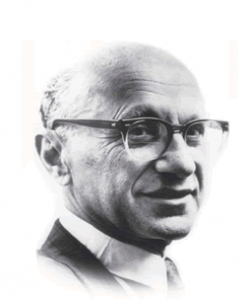Discovering Milton Friedman
After receiving a liberal education, living in liberal New York City in the liberal late 60s, and working in liberal social work, it was refreshing to read the conservative ideas of Friedman in his book, FREE TO CHOOSE. He pointed out a number of myths:
Government must play a dominant role in a modern society.
(False – as proven by Hong Kong and by l9th century America.)
The answer to problems is more government.
(False – the role of government in the U.S. has multiplied many times and we are worse off in many important ways.)
Natural resources are crucial to a nation’s economic success. (False – as shown by l9th century Great Britain and Japan and by 20th century Hong Kong. )
There is only so much wealth: when one person gains, it’s at the expense of another. (False – a voluntary exchange between two parties won’t take place unless both believe they will benefit.)
Free enterprise is a system in which the rich exploit the poor. (False)
A free enterprise economy is unstable. (False – government is the major source of economic instability.)
The l9th century was one of exploitation of the masses by the robber barons of Wall st. who conned Main st., bled Midwestern farmers, and fleeced immigrants. (False – the standard of life for the common man rose dramatically, the number of farmers rose,as did their property values, the flood of immigrants persisted, charity and private education flowered, and libraries and cultural activities grew significantly.)
The Depression was cause by free enterprise. (False – it was caused by the government.)
The Depression meant government intervention was necessary.
(False – price supports caused surpluses, price ceilings caused scarcities, and the minimum wage caused unemployment.)
Government regulations are needed to protect the consumer. (False – regulations have brought shoddy postal service, poor elementary and secondary schooling, and poor long distance train service. Little or no government involvement brings better products, like appliances, shopping centers, and cars.)
A centrally planned economy is best. (False – socialist countries are far behind capitalist countries.)
The energy crisis was caused by the oil industry, consumer waste, and OPEC. (False – by government price controls.)
Tariffs protect our industries from ‘unfair’ foreign competition. (False – they keep our industries from having to adjust to world markets.)
Improved working conditions over the past 200 years are due to unions. (False – they are due to the free market)
When unions have won higher wages, everyone has benefited. (False – the number of jobs affected has dropped, the price of the product has gone up, and the wages of the rest of the workers have dropped.)
Equal opportunity should somehow mean outcome. (False)
Equal outcome is a worthy socialistic ideal. (False – such efforts drove New York City to the brink of bankruptcy. Such efforts in the U.S. brought less production and efficiency, a 25% drop in the employment of senior males, and a rise in crime and welfare. In England, such efforts caused lower production and efficiency, and the emigration of some of its best trained citizens.)
The high unemployment rate of black teenagers is due to discrimination. (False – it’s due to minimum wage)
Public education is untouchable. (False – it’s an unproductive monopoly which needs to be opened to competition.)
Developments have borne out Friedman’s views: deregulation has benefited consumers, the capitalistic U.S. had a far stronger recovery after the ’82 recession than socialist Europe, socialism is retreating, and communism is in decline.
Our media should balance its coverage with conservative views like these.

